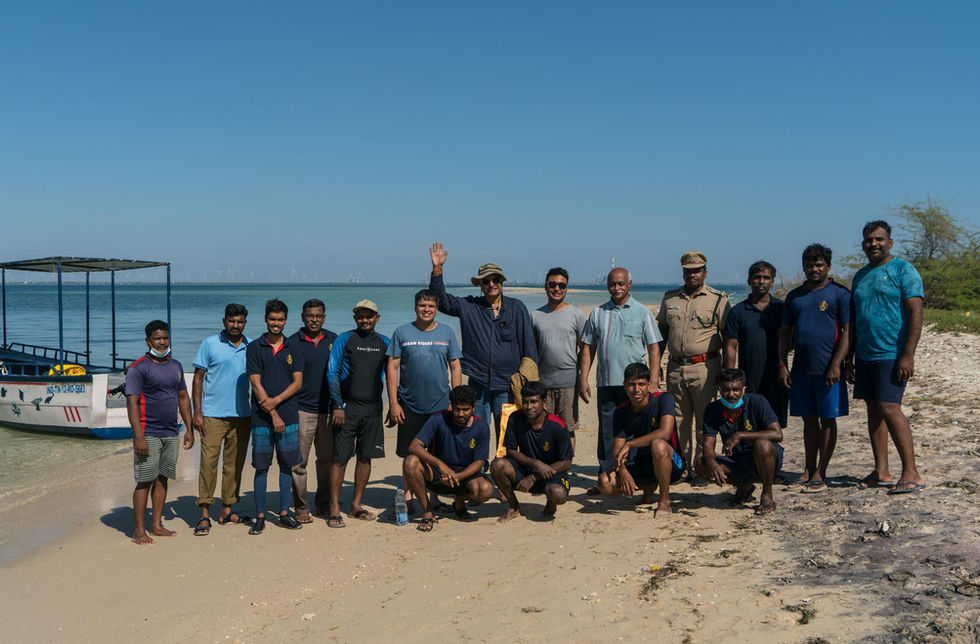Introducing innovative supplementary livelihood for the fishing communities of the Gulf of Mannar
UNESCO World Network of Island and Coastal Biosphere Reserves sponsored a project to introduce supplementary livelihood options for the fishing communities of the Gulf of Mannar Biosphere Reserve in Tamil Nadu, India. Phase 1 of the project entailed detailed fieldwork and stakeholder discussions which led to a series of co-curated Audio-Visual Participatory Rural Appraisal (PRA) workshops to identify possible, practical and acceptable supplementary livelihoods.

The Surabhi Foundation for Research and Cultural Exchange has proposed a unique and innovative approach – using filmmaking, storytelling and training videos - to identify and train for new livelihood options for identified communities living in the Gulf of Mannar Biosphere Rreserve (GoMBR) to mitigate the impact of COVID-19 Pandemic.
This project is initiated under the funds allocated by World Network of Island and Coastal Biosphere Reserves of UNESCO-MAB programme.
The aim of this project is to use the power of filmmaking and storytelling to:
i) Education: Allow the stakeholder communities (Fishing community, returning youth and others) to articulate for themselves possible livelihood options and challenges they face. This will be done through a filmmaking workshop – ‘Indigenous Voices Workshop’ - where the participants will learn how to make short films using mobile camera, and will then venture out and make short stories on their communities.
ii) Training: The project will identify one or two alternate/additional livelihoods for the communities in the region. This will be done through multi-stakeholder discussions. Training video(s) will be made on these identified livelihoods in the local language and disseminated using mobile phones and social media.

UNESCO-Surabhi Foundation team with Tamil Nadu Forest Department Team and SD Marine Research Institute at Vhan Island, Gulf of Mannar Biosphere Reserve.
This project, titled “Reimagined sustainable livelihoods post COVID-19 in Gulf of Mannar Biosphere Reserve” had five stages over two phases. Both phases have been completed.
The aim of this project was to mitigate COVID-19’s effect by promoting unique 'Re-imagined Supplementary Livelihoods' for the fishing community and returning youth in the Gulf of Mannar Biosphere Reserve, and fulfill the general objective of this project by engaging the youth from local communities to identify reimagined innovative sustainable livelihood opportunities.
To accurately identify possible livelihoods that the community finds acceptable, audio-video based PRA's were conducted as part of Phase 1. Community members were trained in filmmaking and asked to make short films using mobile cameras and identify for themselves possible livelihoods and the challenges faced. This allowed the community to identify possible opportunities.
Along with this workshop, which allowed the local community to articulate their vision and challenges, short training videos in local languages was made on an alternative livelihood option (in Phase 2). This became a starter Do-It-Yourself kit for those wishing to explore alternate/additional livelihood options available.
These Reimagined Innovative Livelihood options, identified by the local youth, provides an opportunity for equitable, environmentally sensitive and sustainable economic growth supporting Indian governments One Health Mission and wealth redistribution in line with the Lima Declaration.
Phase 1:
- Stage 1.1: Strategic brainstorming, setting project parameters and liasoning with resource person(s) and Subject Matter Experts (SME).
- Stage 1.2: Project team and SME connected with local community and agencies (government and non-government) and conducted focus group discussions to define and understand the problems and operationalise the project.
- Stage 1.3: Project team and identified SME conduct storytelling, filmmaking and A/V based PRA workshop – “Indigenous Voices” - to identify community livelihood opportunities told by the communities themselves.
Outcome from Phase 1:
Critical understanding, identification and feasibility of implementing community-derived innovative supplementary livelihood possibilities - in this case commercial seaweed cultivation.This leads to initiation of Phase 2. Some of the other livelihood options considered were:
-
- Open Sea Cage Fishing
-
- Ornamental Fish breeding
-
- Eco-tourism/Niche Tourism
-
- Shell collection using Traditional methods
Phase 2:
Phase 2 was implemented based on the findings from Phase 1.

















































